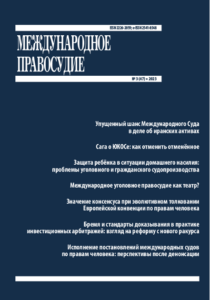Jura novit curia in international commercial arbitration: a comparative law perspective
 Davydenko D., Muksunova R.D. (2023) The principle of jura novit curia in international commercial arbitration: a comparative law perspective. (In Russian, English summary below)
Davydenko D., Muksunova R.D. (2023) The principle of jura novit curia in international commercial arbitration: a comparative law perspective. (In Russian, English summary below)
The article deals with the question of the permissibility and limits of applying the principle of jura novit curia (“the court knows the law”) in international commercial arbitration to ascertain the content of the applicable substantive law. The relevance of this question is based on the existence of an array of approaches to this problem and on the scarcity of specific regulation at the international and national levels. The validity and enforceability of an arbitral award depend on how properly an arbitral tribunal exercises its discretionary powers. Analyzing different legal systems’ approaches may contribute to detection of the risks during an arbitration’s dispute process, award, or enforcement stages, on the one hand, and to the protection of the rights and legitimate interests of the disputing parties, on the other hand. By applying a comparative method, the authors examine the law and practice of several countries in the common and civil law traditions. With respect to the latter, the following conclusions are drawn.
First, in the case law of Sweden and Switzerland arbitrators enjoy wide discretionary powers to ascertain the applicable law subject to the parties’ right to be heard and to discovery, while in France the principle of jura novit curia is applied in a highly restrictive manner.
Second, there are no specific statutory provisions on this question. This statutory gap can be filled by procedural norms for ascertainment of the content of applicable foreign law in a State’s courts, as these norms have de facto impact on the arbitration practice.
Common law countries have adopted special provisions that empower arbitrators to choose the approach unless it has been otherwise agreed by the parties. In some jurisdictions the limits on jura novit curia are notably broad. The law and practice of England and Wales and Singapore do not put constraints on it unless the award causes substantial injustice. Hong Kong courts hold that there are almost no restrictions if the parties have chosen an arbitrator who is qualified in the applicable law. The United States has adopted the civil law approach.
For citation: Давыденко Д.Л., Муксунова Р.Д. Принцип jura novit curia в международном коммерческом арбитраже: взгляд зарубежных правопорядков // Международное правосудие. 2023. № 3 (47). С. 130–147.











